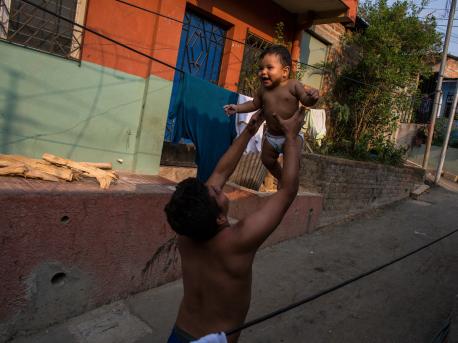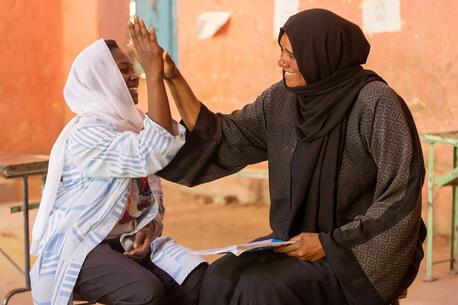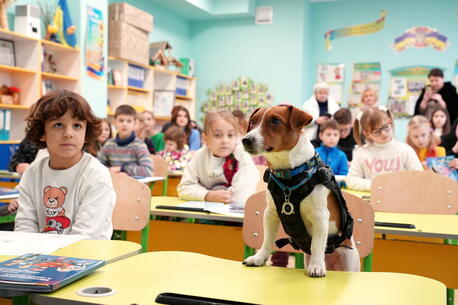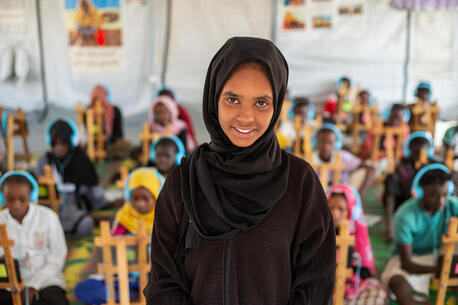
Building a Safe Home for Children
The fight to end child trafficking is a crucial part of UNICEF's commitment to protecting the rights and futures of children everywhere.
Homes aren't made of a single brick or one plank of wood. They are built of many pieces that contribute to a larger structure — one that is meant to provide safety and comfort for its inhabitants for years to come. When looking at a house, it is easy to forget that it is made up of many parts and that, if all the elements are not firmly in place, the home will cease to stand.
UNICEF's child protection work is much like a home: There are many seemingly disparate pieces that, when combined, are vital to the achievement of a larger goal. UNICEF's commitment to stop child trafficking, including the End Trafficking Project, is one of many critical initiatives designed to ensure that children's rights are protected and that children everywhere have the opportunity to thrive. End Trafficking sits alongside other crucial child protection issues, such as:
- Preventing the recruitment of children by armed groups and forces
- Birth registration
- Ending child marriage
- Removal of landmines and other explosive remnants of war
Kidnapped at the age of 15 from her northern Uganda boarding school, Grace Akallo was forced to fight in Joseph Kony's Lord's Resistance Army in South Sudan. After her release, she became an activist, speaking out against the abduction of children by mililtant groups and using her experience to counsel other former child soldiers.
Children need protection from early marriage and forced labor
What often makes child protection work difficult to comprehend is that many initiatives attempt to address harmful systems or social norms, rather than react to direct tangible needs. This makes immediate outcomes harder to measure. For example, ending child marriage may require working with governments to shape policies or engaging with community members to challenge the notion that children —especially girls — are ready for marriage at a young age.
When a 10-year-old Afghan girl's future was threatened by early marriage, her mother worked with local members of the UNICEF-supported Child Protection Action Network to convince the girl's father to cancel the wedding he had arranged for her with a 50-year-old married farmer.
Monitoring the success of these types of initiatives is a more long-term process. A vaccination campaign, by contrast, may yield more immediately measurable results. Both programs achieve a critical outcome: ensuring childhood survival and protecting children's rights. However, it is understandably harder to conceptualize the benefit of a prevention-based child protection program when its benefits occur over many years or are not easily quantifiable.
This does not mean that child protection work is not crucial.
In fact, addressing systemic inequalities is necessary to create an environment that will support children, not only today, but decades into the future. While benefits from this type of work are not immediate, they are incredibly powerful.
Poverty, gender inquality and unsafe migration make children susceptible to trafficking
The End Trafficking Project is based on the conviction that ending trafficking does not stop at providing direct survivor support. It requires the creation of a culture where trafficking cannot thrive in the first place. This means addressing underlying issues such as the demand for commercial sex and cheap goods, as well as mitigating or eliminating the vulnerabilities that may make a child susceptible to trafficking, such as poverty, gender inequality and unsafe migration. Though we may not witness the culmination of our work, we truly believe that planting the seed for change is not only important but imperative for creating a brighter future for children everywhere.
January is End Trafficking month!
Here's how you can get involved to end child trafficking:
- Tune into the Ending Human Trafficking Locally and Globally podcast on January 11th to learn about how students can get involved in the fight to end trafficking.
- Tell your Congressional Representatives that you support the passage of the Stop Enabling Sex Traffickers Act (SESTA). Ask your Senator to become a co-sponsor of the bill. Learn more here.
- Donate to support the End Trafficking Project at UNICEF USA.
- Join us in activating for National Freedom Day on February 1st. For sample posts, please visit the UNICEF USA Social Media Press Kit.
Want to learn more about child protection and how to make systemic change in your own community?
- Check out UNICEF USA's global Child Protection work here.
- Your voice is powerful. Research local anti-trafficking laws. See a gap or harmful policy? Let your Congressional Representatives know.
- Make systemic change part of your job description by running for political office.
- Are you a student that wants to learn more about trafficking? Ask your teacher or professor to lead a discussion or or entire class on trafficking issues.
Hanna Cody is a Global Citizen Fellow with the UNICEF USA End Trafficking Project.
Top photo: The future is uncertain for the children of El Salvador, like this little boy with his father in San Salvador. El Salvador has one of the highest murder rates in the world. Unaccompanied children leave home every day in search of a safer future. © UNICEF/UN018627/Zehbr


